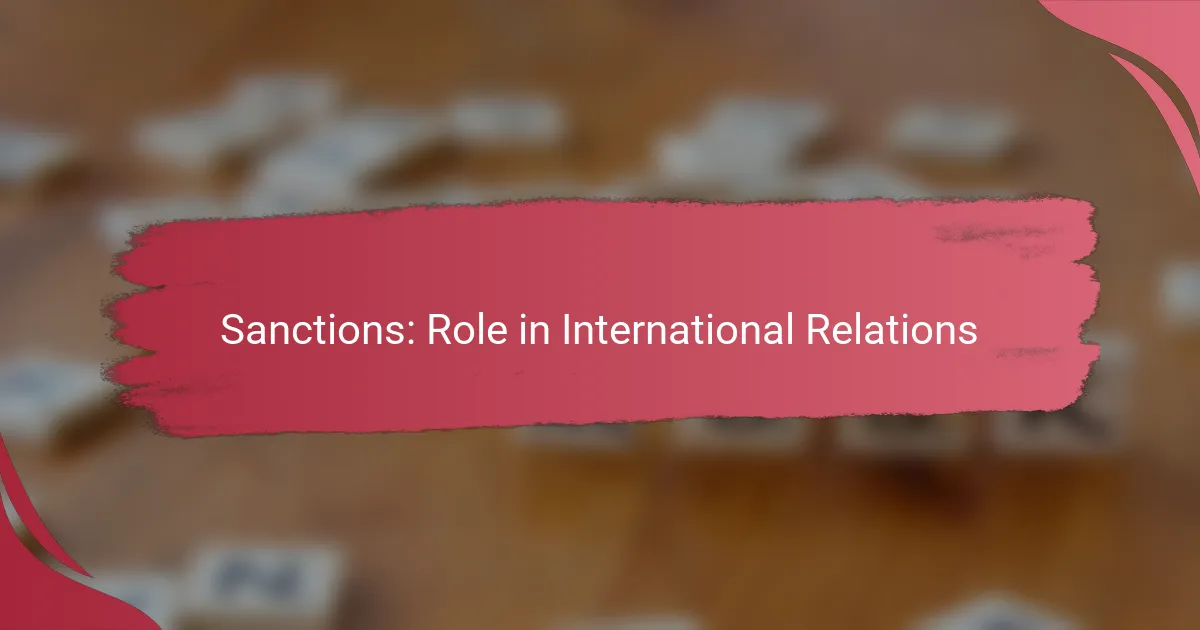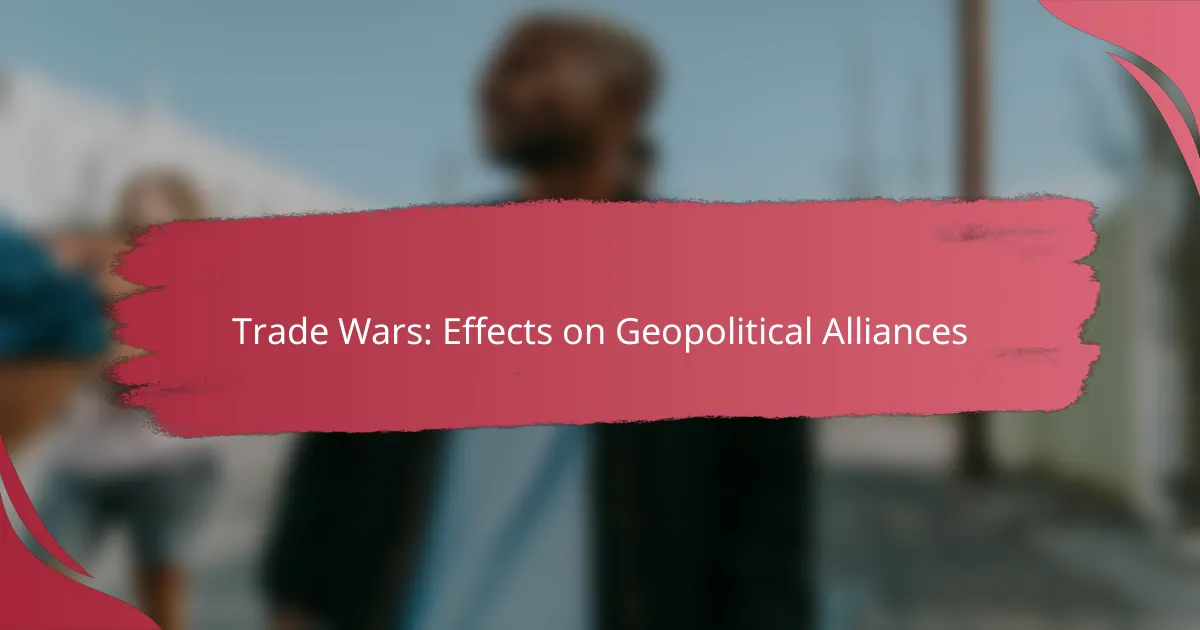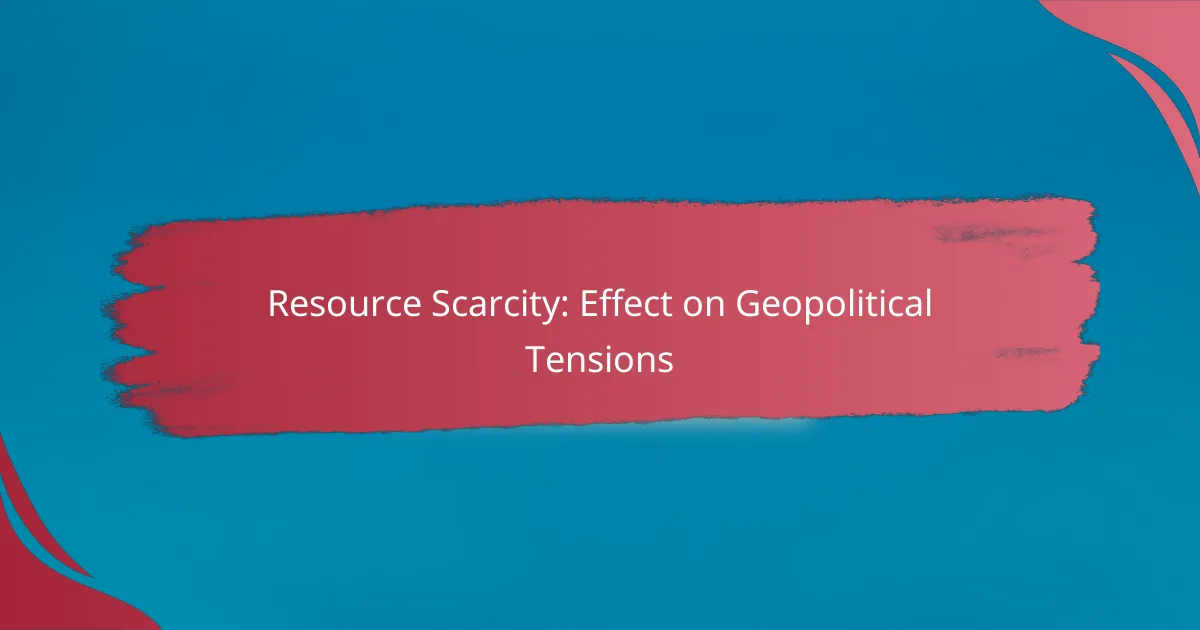Sanctions play a crucial role in shaping international relations by modifying the economic and political dynamics between countries. These measures, which can include economic restrictions, military embargoes, and travel bans, are employed to influence the behavior of targeted nations without resorting to military conflict. While they aim to promote human rights and deter aggressive actions, sanctions can also lead to strained diplomatic relations and affect global trade.
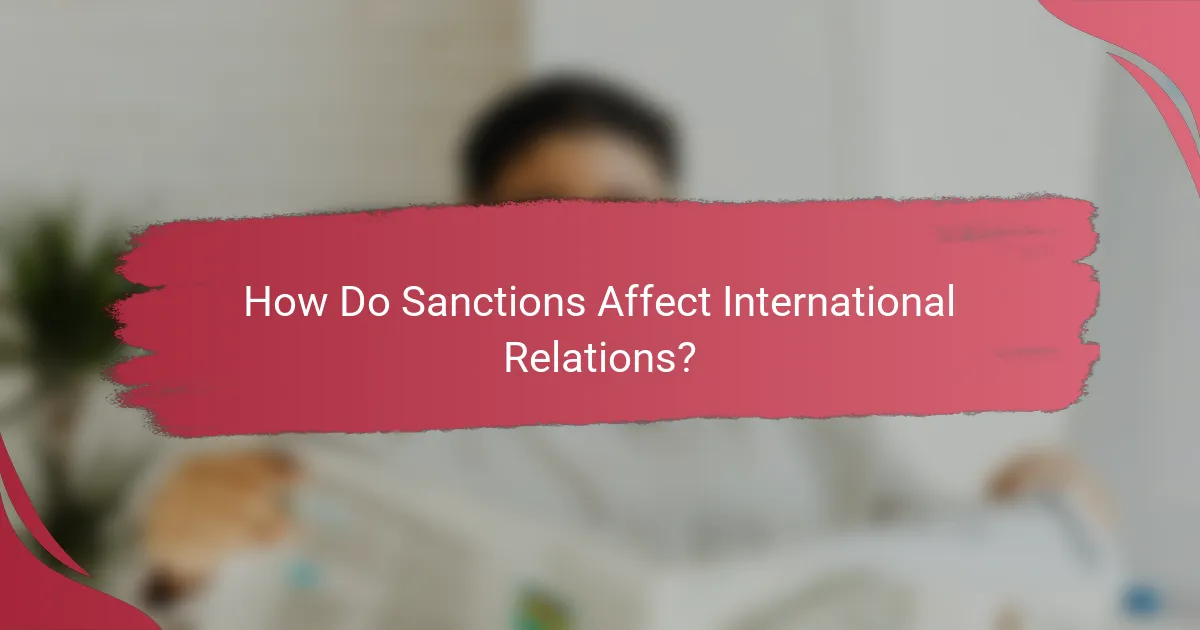
How Do Sanctions Affect International Relations?
Sanctions significantly influence international relations by altering the economic and political landscape between nations. They can compel targeted countries to change specific behaviors, but they may also strain diplomatic ties and impact global trade.
Economic impact on targeted nations
Sanctions often lead to severe economic consequences for the nations they target. These can include reduced access to international markets, decreased foreign investment, and inflationary pressures, which can severely impact the standard of living for citizens. For instance, countries like Iran and Venezuela have faced economic downturns due to sanctions affecting their oil exports.
Additionally, the economic isolation can lead to shortages of essential goods and services, prompting humanitarian crises. Countries may experience a decline in GDP, often ranging from low single-digit percentages to double digits, depending on the severity and duration of the sanctions.
Influence on diplomatic negotiations
Sanctions can serve as leverage in diplomatic negotiations, encouraging targeted nations to alter their policies or actions. For example, sanctions imposed on North Korea have been used to push for denuclearization talks. However, they can also create resentment, making negotiations more challenging if the targeted nation feels cornered.
Successful negotiations often require a careful balance; while sanctions can pressure a government, they may also lead to a hardening of positions. Diplomatic channels must remain open to facilitate dialogue and potential resolutions.
Effects on global trade dynamics
Sanctions can disrupt global trade dynamics by altering supply chains and trade routes. Countries that comply with sanctions may seek alternative markets, leading to shifts in trade partnerships. For instance, when Western nations imposed sanctions on Russia, it turned to countries like China and India for trade opportunities.
Furthermore, sanctions can lead to increased costs for businesses globally as they navigate compliance and seek new suppliers. Companies must assess risks and adapt their strategies to mitigate the impact of sanctions on their operations and market access.

What Types of Sanctions Are Commonly Used?
Commonly used sanctions include economic, military, and travel bans, each serving distinct purposes in international relations. These measures are tools employed by countries or international organizations to influence behavior without resorting to military action.
Economic sanctions
Economic sanctions are restrictions imposed on trade and financial transactions with a targeted country or entity. They can take various forms, including trade embargoes, asset freezes, and restrictions on financial services.
For example, a country might restrict the import of certain goods from a nation accused of human rights violations. Such sanctions can significantly impact the economy of the targeted nation, often leading to inflation and shortages of essential goods.
When considering economic sanctions, it is crucial to assess their potential effectiveness and the humanitarian implications they may have on the civilian population.
Military sanctions
Military sanctions involve the prohibition of arms sales and military assistance to a specific country. These measures aim to limit the military capabilities of the targeted nation and prevent escalation of conflicts.
For instance, the United Nations may impose military sanctions on a country engaged in aggressive actions against its neighbors. Such sanctions can help deter further military aggression but may also lead to increased tensions in the region.
It is important to evaluate the potential consequences of military sanctions, as they can sometimes provoke retaliatory actions from the targeted state.
Travel bans
Travel bans restrict individuals from entering or transiting through certain countries, often targeting political leaders or individuals associated with human rights abuses. These bans are intended to hold specific individuals accountable for their actions.
For example, a government may impose travel restrictions on officials from a country accused of corruption or war crimes. Travel bans can serve as a diplomatic tool to signal disapproval and pressure for change.
When implementing travel bans, it is essential to ensure that they are well-defined and targeted to avoid unintended consequences on innocent individuals.

What Are the Goals of Implementing Sanctions?
The primary goals of implementing sanctions are to influence the behavior of targeted nations or entities, deter aggressive actions, promote human rights, and drive political change. Sanctions can take various forms, including economic restrictions, trade barriers, and diplomatic measures, all aimed at achieving specific international objectives.
To deter aggressive actions
Sanctions serve as a tool to deter nations from engaging in aggressive or hostile actions. By imposing economic penalties or trade restrictions, the international community signals that certain behaviors, such as military aggression or violations of international law, will not be tolerated.
For example, sanctions against countries that threaten their neighbors or violate territorial integrity can reduce the likelihood of military escalation. The effectiveness of these measures often depends on the unity and resolve of the countries imposing the sanctions.
To promote human rights
Another goal of sanctions is to promote human rights by pressuring governments that violate the rights of their citizens. Economic sanctions can target specific sectors, such as arms sales or financial transactions, to limit the resources available to oppressive regimes.
For instance, sanctions against countries with poor human rights records may include restrictions on trade in goods that could be used for repression. This approach aims to encourage governments to adopt more humane policies and practices.
To influence political change
Sanctions can also be employed to influence political change within a country. By targeting key political figures or institutions, sanctions seek to weaken the power of regimes that do not align with international norms or democratic principles.
For example, sanctions may be placed on specific individuals responsible for corruption or human rights abuses, thereby creating pressure for reform. The effectiveness of these sanctions often hinges on the level of international cooperation and the targeted government’s resilience to external pressure.

How Effective Are Sanctions in Achieving Their Goals?
Sanctions can be effective tools for influencing a country’s behavior, though their success varies widely based on context and implementation. They aim to compel compliance with international norms or punish undesirable actions, but their effectiveness often hinges on factors like the targeted nation’s economy, political structure, and the unity of the sanctioning countries.
Success rates in changing behavior
The success rates of sanctions in changing a nation’s behavior are generally estimated to be low, often cited around 30-40%. Factors influencing success include the type of sanctions imposed, the resilience of the targeted regime, and the level of international support for the sanctions. Economic sanctions tend to have a higher success rate when they are comprehensive and backed by multilateral efforts.
Case studies of successful sanctions
One notable case of successful sanctions is the international response to South Africa during the apartheid era. Economic and cultural sanctions, combined with diplomatic pressure, played a significant role in dismantling the apartheid regime. Another example is the sanctions imposed on Iran, which led to negotiations over its nuclear program, resulting in the Joint Comprehensive Plan of Action in 2015.
Limitations and unintended consequences
Sanctions can have significant limitations, including the potential to harm civilian populations more than the intended targets. For instance, comprehensive sanctions on Iraq in the 1990s led to widespread humanitarian crises without effectively changing the regime’s behavior. Additionally, sanctions can sometimes strengthen the resolve of the targeted government, leading to increased nationalism and resistance against external pressures.
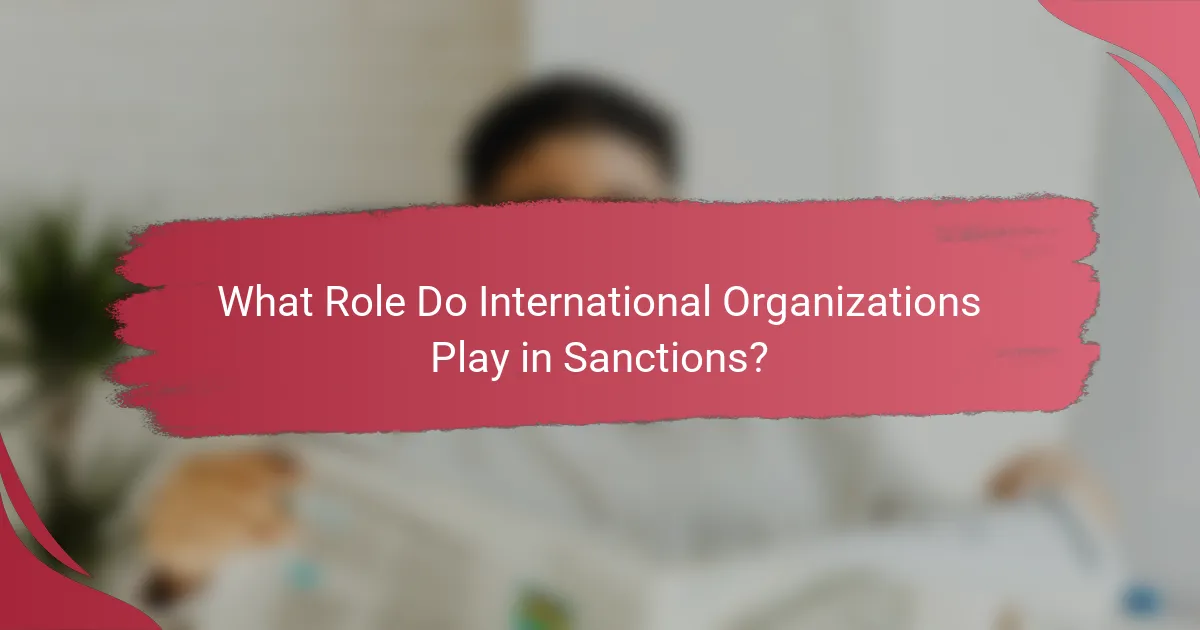
What Role Do International Organizations Play in Sanctions?
International organizations play a crucial role in the implementation and enforcement of sanctions, often serving as platforms for consensus-building among member states. They facilitate coordinated actions that aim to influence the behavior of targeted nations or entities through economic and diplomatic measures.
United Nations sanctions
The United Nations (UN) is a primary actor in global sanctions, often imposing measures to maintain or restore international peace and security. UN sanctions can include arms embargoes, asset freezes, and travel bans, which are typically enforced through Security Council resolutions. For example, sanctions against North Korea have been aimed at curbing its nuclear weapons program.
Member states are obligated to comply with UN sanctions, which can lead to significant diplomatic pressure on nations that resist. However, the effectiveness of these sanctions can vary, depending on the unity and commitment of the member states involved.
European Union sanctions
The European Union (EU) also plays a vital role in imposing sanctions, often complementing UN measures or acting independently in response to regional crises. EU sanctions can target specific individuals, entities, or sectors, such as finance or energy, and are designed to exert pressure without resorting to military action. For instance, sanctions against Russia following its actions in Ukraine have included economic restrictions and asset freezes.
EU sanctions require unanimous agreement among member states, which can sometimes lead to delays or diluted measures. Nonetheless, these sanctions are legally binding within the EU and are enforced through national legislation.
Coordination among member states
Coordination among member states is essential for the effectiveness of sanctions imposed by international organizations. This involves sharing intelligence, aligning policies, and ensuring that all parties implement the sanctions consistently. Effective coordination can enhance the impact of sanctions, making it harder for targeted nations to evade restrictions.
Challenges can arise when member states have differing political interests or economic ties with the targeted nation. To mitigate these issues, regular meetings and communication channels are established to foster collaboration and address concerns promptly. Member states should prioritize transparency and commitment to the agreed-upon sanctions to maintain their integrity and effectiveness.
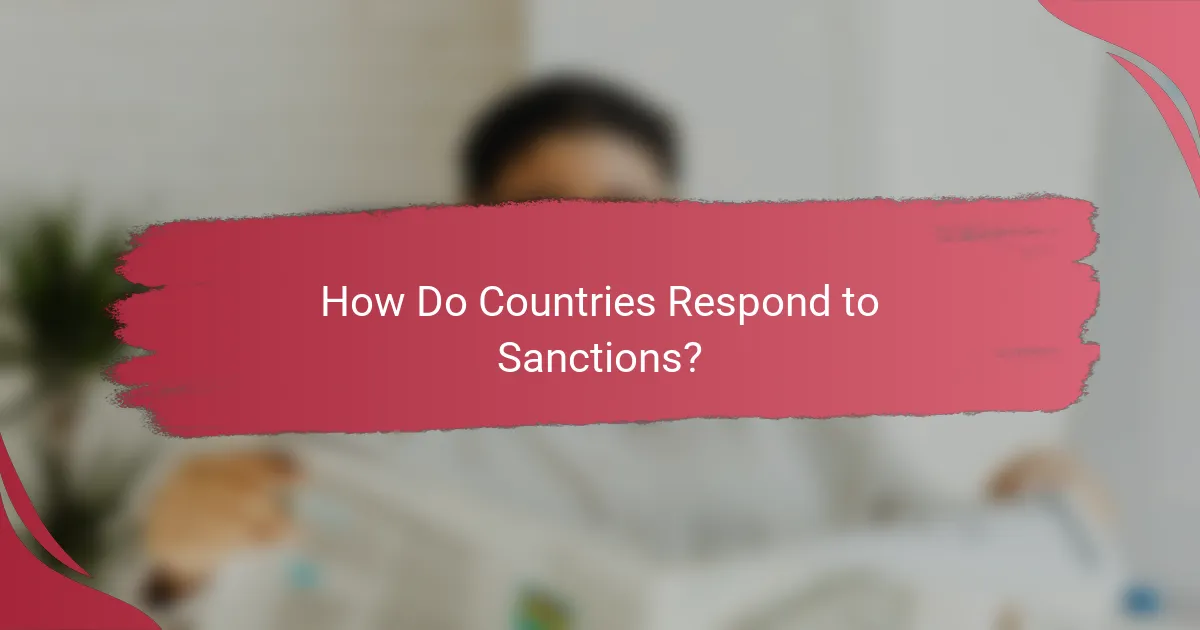
How Do Countries Respond to Sanctions?
Countries typically respond to sanctions through a combination of countermeasures, diplomatic efforts, and economic adjustments. These responses aim to mitigate the impact of sanctions and maintain national interests while navigating international relations.
Counter-sanctions strategies
Counter-sanctions strategies involve retaliatory measures taken by a country facing sanctions. These can include imposing their own sanctions on the originating country, targeting specific industries, or restricting trade in key goods.
For example, a country may ban imports of certain products from the sanctioning nation or limit the export of critical resources. Such actions can escalate tensions and lead to a cycle of retaliatory measures.
Diplomatic outreach
Diplomatic outreach is a strategy where countries seek to engage with other nations to build alliances and garner support against sanctions. This can involve negotiations, public diplomacy, or forming coalitions with like-minded countries.
Countries may also attempt to appeal to international organizations or forums to challenge the legitimacy of the sanctions. Building a narrative around the sanctions as unjust can help in swaying public opinion and gaining diplomatic leverage.
Economic adjustments
Economic adjustments refer to the changes a country makes to its economic policies and practices in response to sanctions. This can include diversifying trade partners, finding alternative markets, or adjusting domestic production to reduce reliance on sanctioned goods.
For instance, a country may increase trade with non-sanctioning nations or invest in local industries to replace imported goods. These adjustments can help stabilize the economy but may require significant time and resources to implement effectively.
